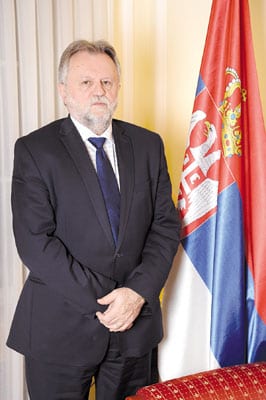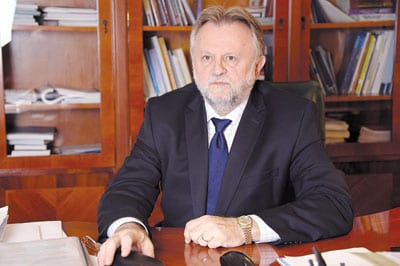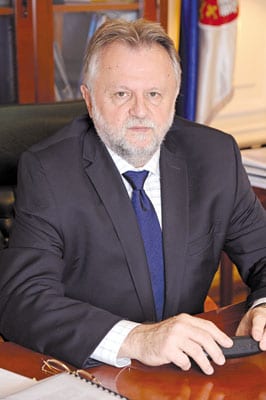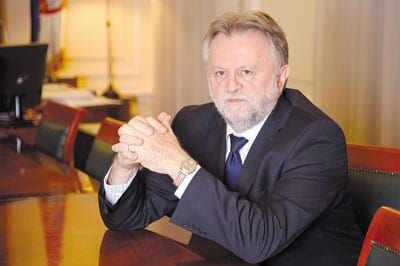The upcoming elections, whether just presidential or presidential and parliamentary, will be a new test of whether people in Serbia are willing to accept reforms which will lead to the establishment of the cornerstone of a modern Serbia with a sustainable economy that is able to create new jobs and attract foreign direct investments. This should be the backbone of the pro- reform and pro-EU campaign in Serbia
Serbia has received many compliments for the reforms so far implemented. However, the list of things to be done is still quite long and, more than anything, very demanding.
In fact, quite often electoral cycles have disrupted the pace of reforms and some of the toughest challenges facing the government have persisted for some time.
In this interview with Serbian Finance Minister Dušan Vujović, following the announcement of new presidential, and possibly parliamentary, elections, we discussed the tasks ahead for the government, the challenges posed by the elections when it comes to scheduled obligations and the willingness of the society to proceed on the road leading to sustainable economic growth and prosperity.
As we have witnessed many times, this road is often rocky and seeks – not just from the government, but also from the municipal-level administration and public companies – different actions, the streamlining of their operations and that they become much more efficient than they used to be.
On top of that, it also seeks understanding from citizens in term of deciding responsibly on the options proposed during the election cycle.

What seems to be behind us are tough austerity measures. As noted by this minister in late 2016, too much belt tightening would be counterproductive and halt Serbia’s prospects of reaching a sustainable level of public debt and deficit. The reason things look promising is mainly due to the government having accomplished more than it planned.
At present, it seems that we are closer to a sustainable level of public debt, with the economy continuing to grow. According to the official forecast, there will be economic growth of 2.7% to 2.8% in 2017, with a record low budget deficit of 1.7% of GDP.
The share of public debt in GDP is predicted to fall to 72.8% by the end of this year. That is as little as 0.7% less compared to 2016, but it’s important that Serbia is on its way to reducing it to 60%, in line with the Maastricht rules.
However, there is still no space for tax and contribution cuts, and the ban on hiring in the public sector must remain intact.
Many factors can change the picture. As Minister Vujović noted recently, the most serious global challenge Serbia is facing is an extremely complex and unpredictable situation in Europe and the world, but what matters far more for Serbia is how to boost investments, finalise the restructuring of state-owned, loss-making companies and revitalise production.
Indeed, this is an important question and one which proved to be the toughest for many governments prior to this one. As stated several times before, Vujović again noted that what makes these reforms tough is the resistance of “managers and trade unions” in state-owned loss-makers, who “insist that restructuring requires the observation of procedures and programmes”.
Later in the year the focus will shift to improvements in the financial sector (assessment of the Development Fund and the export promotion agency, and privatisation of Dunav Insurance), the closure of inefficient power plants in EPS, orderly transformation of tax administration, and adoption wage system legislation for local governments and public services
For many Serbian governments, that kind of resistance became an insurmountable mountain. In this case, the government needs clear backing from the electorate if it wants to finish the job in the correct way.
Vujović himself recognises that the success so far achieved could also be endangered if the envisaged reforms in education and social services, in cutting administration and surplus employees in the public sector, are not carried out properly. “Despite good progress, we still have a long list of ongoing reforms that need monitoring and support,” says Vujović.
Summaries in the sixth review of the three-year engagement of the IMF in Serbia say that the programme of reforms has remained on track and the economy has continued to strengthen. Significant fiscal over-performance and renewed efforts to address structural weaknesses have helped boost confidence. This, along with a healthy credit recovery on the back of substantial monetary policy easing, has helped restore robust growth, while persistently low inflation has reinforced recovery in real incomes.
However, the IMF remained cautious when it comes to public enterprises, even warning the government of the possible new accrual of debt. These reforms are crucial, as they prevent possible downside fiscal risks (caused by the assumption of public enterprise debts) and the creation of an efficient business environment that would attract investments, create jobs and generate exports.
You asked the IMF to switch to half-yearly reviews of the programme, which would constitute a tacit sign of confidence in the way the government is implementing reforms. In your opinion, have you thus far fulfilled all of the most important expectations placed before Serbia by the programme?
– Formally, we did request a move to a half-yearly review schedule, but that reflected the joint position of both teams, based on very good macroeconomic and growth performances, and the restored momentum of structural reforms.
During 2017 we will have two formal reviews: the first will be concluded based on data from end-March and the second based on end- September data, and conditionality.

A growing share of staff time and resources will be devoted to finalising ongoing reforms and analysing key aspects of sustainability beyond the end of the programme.
Despite good progress, we still have a long list of ongoing reforms that require monitoring and support. Hence, performance criteria will continue to be observed quarterly and new structural benchmarks will be introduced to foster reforms in education and social services, right size public administration and the public sector, and resolve problematic enterprises.
Later in the year the focus will shift to improvements in the financial sector (assessment of the Development Fund and the export promotion agency, and the privatisation of Dunav Insurance), the closure of inefficient power plants in EPS, orderly transformation of the tax administration, and the adoption of wage system legislation for local governments and public services.
Although undisputed results have been achieved in fiscal stabilisation, it seems that the government still faces a long road in order for all expenditures at the state and local levels (including indirect budget beneficiaries) to be integrated and subjected to sharper and more consistent controls. What does 2017 bring in this regard?
– Indeed, we will continue to improve the budget process, better manage (plan and implement) public expenditures, especially capital expenditures. A comprehensive public expenditure review will soon be launched to assess quality, efficiency and efficacy in achieving set immediate and broader development objectives.
The objective is to set up a permanent capacity in the Ministry of Finance and all (or at least key) line ministries to permanently monitor implementation based on measurable performance indicators.
These efforts will yield results only if they are applied across the board, at all levels of government and to all users of budget resources. The impact will be quite limited if the improvements are applied only to the public administration serving the central government.
At the beginning of this fiscal consolidation program we postulated that half of the government proceeds should go on the repayment of the most expensive debts and half channeled to the most efficient investment projects. None should be allowed to leak into consumption
To what extent are the results achieved so far in fiscal stabilisation a product of one-off “miracles”, and how much are they a product of the core stabilising of budget revenues? Do you calculate that the sale of Komercijalna Banka at year’s end could have a serious impact on this result?
– Indeed, we have had many one-offs during the first two years of the fiscal consolidation programme. But they were by no means miracles. Some were quite predictable (public company dividends, revenues from the new digital agenda etc.). Some fit the concept of “inevitable surprises” (advanced by P. Schwartz) and some just reflect our limited capacity to forecast revenues and expenditures. On a net basis, one-offs have had a very limited impact.
During 2016 the actual general government fiscal balance (1.4% of GDP) was 2.6 percentage points better than planned (4% of GDP). One-off revenues contributed almost a third of that improvement (0.85% of GDP), but one-off expenditures took away most of it (0.75% of GDP). On a net basis, one-off elements explained only 0.1%.
We look realistically at all one-off elements and eliminate them from our projections in order to control the risks.
We do not plan any privatisation revenues in our budget projections. In the case that proceeds from privatisation do materialise, we follow a rule-based approach in utilising additional resources. At the beginning of this fiscal consolidation programme, we postulated that half of the government proceeds should go on the repayment of the most expensive debts and half should be channelled into the most efficient investment projects. None should be allowed to leak into consumption.
You announced in recent statements that we could also hope for a surplus by the end of 2017. Does a surplus, which we once more achieved during the time of your colleague Mlađan Dinkić, even make sense and how much can that actually be counterproductive when it comes to economic growth?
– There has been a lot of incomplete, inconsistent or even erroneous information on historical deficit figures. The confusion is caused by many different concepts of budget and fiscal deficit being used. Untangling this debate goes way beyond this interview.
So, I will try to answer this question with reference to the broadest and most reliable concept: the fiscal balance of the general government.

Based on official Ministry of Finance and IMF figures on budget implementation, we had fiscal deficits of the general government in all years after 2001 with the exception of 2004 (when the balance was zero) and in 2005 (when a surplus was recorded at the level of 1.1% of GDP).
Fiscal deficits are acceptable as long as they are consistent with longer-run debt sustainability and secure efficient use of public resources. Debt sustainability is secured if a country has a primary fiscal surplus and the cost of debt is equal to, or lower than, the GDP increment.
Last year Serbia had a primary surplus equal to 1.8% of GDP and the interest payments (about 130 billion RSD) were smaller than the increase in GDP (about 160 billion RSD). Accelerating the pace of debt-GDP reduction at the expense of GDP growth (due to overly tight fiscal policy) and infrastructure projects (as a basis for future GDP growth) does not seem like a smart choice at this stage of economic development in Serbia.
In a letter of intent addressed to the IMF at year’s end 2016, you stated clearly that it is necessary to speed up reforms if lasting success is desired. Does this represent an indirect acceptance that holding elections too often takes a toll by slowing down the resolving of some key issues?
– I have already emphasised the importance of reforms, both in terms of preventing possible downside fiscal risks (caused by the assuming of public enterprise debts) and in terms of creating an efficient business environment that would attract third generation investment (regional hubs), create jobs and generate exports. Frequent elections divert attention away from reforms and problem-solving capacities at all levels. I hope the election outcomes foster ownership of reforms and at least partially compensate for the lost energy and focus on reforms and business promotion.
Last year Serbia had a primary surplus equal to 1.8% of GDP and the interest payments (about 130 bn RSD) were smaller than the increase in GDP (about 160 bn RSD). Accelerating the pace of debt-GDP reduction at the expense of GDP growth (due to overly tight fiscal policy) and infrastructure projects (as a basis for future GDP growth) does not seem like a smart choice at this stage of economic development in Serbia
Likewise, you have also acknowledged that regulating the situation in large enterprises, like EPS, Srbijagas, Petrohemija, Azotara, MSK and RT Bor, actually represents a very difficult task. So difficult in fact that it seems not enough has changed in this respect since the start of the programme with the IMF. How does this institution view the apparent shortfall in realising their restructuring and privatisation?
– Progress has been made in reforming large public enterprises. In the initial design of the reform programme, we emphasised that the restructuring of public enterprises is at the core of structural reforms.

In our last discussions with the IMF, we focused on speeding up the implementation of reform plans, including those for large energy and transport companies, as well as the portfolio of the former Privatisation Agency.
The fiscal policy objectives set out in the 2017 budget need to be supported by the strengthened implementation of public administration reform and SOE restructuring to safeguard the achieved fiscal adjustment and preserve public debt sustainability. Successful fiscal consolidation and macroeconomic stability will only be sustainable in the long run if they are supplemented with structural reforms and lead to strong inclusive growth.
In that context, what do you consider as being the key watersheds in 2017 that will determine whether or not Serbia is moving towards sustainable fiscal stabilisation?
– Past and expected fiscal performance, along with planned reforms within the Ministry of Finance based on detailed functional reviews completed last year, and the completion of the managerial, organisational and financial restructuring of SOEs and public utility companies, provide a solid base to consolidate the already achieved fiscal results and get the economy on a sustainable growth path.
The fiscal policy objectives set out in the 2017 budget need to be supported by strengthened implementation of public administration reform and SOE restructuring to safeguard the achieved fiscal adjustment and preserve public debt sustainability. The successful fiscal consolidation and macroeconomic stability will be sustainable in the longer run only if they are supplemented with structural reforms and lead to strong inclusive growth
Relatively recently another former fellow finance minister, Božidar Đelić, said that he was concerned for the Western Balkans, including Serbia because at a time when investors are literally sitting on huge amounts of money they are continuing to bypass this region and our country. In your opinion, what is hindering the greater inflow of FDI, which is far below the previous, but also modest, $2.5 billion?
– In order to be able to attract large investors, Serbia needs to complete the ongoing reforms, clean the banking system of NPLs, restore the capital market and focus the bulk of political attention on creating and respecting market institutions, securing the highest standards of governance, the rule of law and ownership and creditor rights.
Will the legislative changes being introduced by the Ministry of Finance, as an important factor in controlling large projects in public-private partnerships, finally push forward this form of financing in Serbia?
– The Ministry of Finance has gate-keeper, risk and quality control roles in these processes, which are driven by economic/market potential and best managerial skills. PPPs are one of the possible forms of creating value, jobs, economic growth and exports.
PPPs have both advantages and disadvantages. We need to develop the necessary institutions and risk mitigating mechanisms to promote and enable win-win propositions and halt risky non-transparent deals.
How would you assess the effect of expected presidential elections and possible parliamentary elections? How, for example, have previous parliamentary elections impacted on your work as finance minister?
– We hope that these elections will confirm the will of the people to accept difficult reforms as the cornerstone of a modern Serbia, capable of generating sustainable economic growth, creating new jobs and attracting foreign direct investments (which already exceed the current account deficit).
As I said on a similar occasion last year, fresh thinking is needed to demonstrate dynamic trade-offs where everybody wins in the medium term if reforms are completed, and almost everybody loses if reforms are stalled or abandoned. This should be the backbone of the pro-reform and pro-EU campaign in Serbia. One can only hope that Serbian voters will see or feel that other political, economic and social alternatives are inferior.